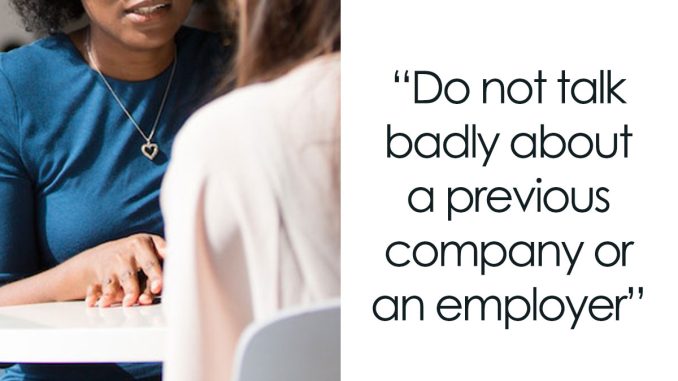
People say to not quit a bad job until you have secured a new one, but as anyone who has ever touched the job market knows, this means applying, where, if you are lucky, you might get an interview. Then comes the next challenge of sitting down and being evaluated face to face and hoping they like you.
The nerves and pressure of the circumstances make a lot of people jittery, so TikToker and career advisor Julia Haber put together a collection of common mistakes people make and some tips and tricks for interviews. So read through, upvote your favorites, and comment your thoughts below.
More info: TikTok
#1
Do not talk badly about a previous company or an employer
Image credits: julia.haber
Talking in a professional setting can be nerve-wracking, but interviews come with a number of pitfalls that ultimately make all of us somewhat nervous. You don’t want to lie, but the goal of the conversation is mostly to convince another party to give you something you want. You often have no idea who you are competing against, so you may want to pull out all the stops, but most of us mentally can’t think this quickly.
The result is stress, which can impact interview performance, making a person self-conscious, which then is its own cycle of despair. If you suffer from nerves when interviewing, it’s best to set limited goals so you don’t spiral when less realistic goals don’t happen. Focus on being professional above all else, as skills can be taught, but a mindset is harder.
#2
When interviewer says “so tell me about yourself”, don’t babble for 5 minutes, don’t tell a story – share only relevant information
Image credits: julia.habor
#3
Be prepared to give an answer to the question “What would be the number one reason why you wouldn’t take the role?” It gives a look into your mind and gives a sense of your risk appetite and your biggest fears
Image credits: julia.haber
Other people, deathly afraid of awkward silences, might start to overshare, in an attempt to keep the conversation going or forge a relationship very quickly. Human communication wasn’t developed for HR interviews quickly, after all. Oversharing is a pretty common human reaction to various situations. Maybe we want the interlocutor to feel better or we are nervous and want to distract ourselves.
In an interview setting, it’s potentially better to overshare than under share, but only if you don’t delve into the wrong topics. Discussing politics or religion during a job interview is probably not the greatest idea, nor is sharing some embarrassing personal stories, which, at best, will make you seem a bit unprofessional.
#4
Do not forget to ask the employer questions. These are few good questions to ask:
1. What opportunities are there for training or progression?
2. What is something I cant learn about the company online?
3. What is one thing you would change about the company if you could?
Image credits: julia.habe
#5
This is the interview question that most people get wrong. What would be your dream job if this role wasn’t on the table? This is your opportunity to say I want to open a restaurant, join NASA. Cookie cutter answers are boring and showcasing your passions is one great way to stand out as candidate.
Image credits: julia.haber
#6
People will decide if they wanna hire you in the first 2 minutes of your conversation. They wanna know these things about you:
1. Are you normal and can you hold a conversation
2. Do you actually want this job
3. Are you giving me the confidence to believe that you can actually do the job
If all this is stressing you out, you aren’t alone. While the prospect of interviewing keeps many people tied to the same job, more and more people are starting to realize that a toxic work environment is not good for them. US statistics show that up to 36% of workers have or plan to quit a job without lining up another one, even though only 22% actually feel confident in finding alternative employment.
This last statistic is telling, as many of us will work multiple jobs throughout our lives, but the vast majority of people still struggle with the fear of not being able to find another job. Interestingly, a bad manager is such a toxic factor, that it “helps” around 60% of people who quit “take the plunge” and just leave. So asking about management seems like a good thing to look out for when interviewing, even though they will probably never give you an honest answer.
#7
Share one personal anecdote that gives a look into your personality. Like “I’ve always learned non-conventionally, so I’m always willing to try and try until I get it right”
Image credits: julia.haber
#8
Structure your thoughts before you talk.
Image credits: julia.haber
#9
Don’t curse or say slang words or any Gen Z words they may not understand
Image credits: julia.haber
#10
Be clear. You don’t want them to misinterpret your point
Image credits: julia.haber
#11
Take language from the job description and specifically use it in relation to another job that you’ve had. “learned I was meant to A work in (industry) with (role) Al during my time at (company)”
Image credits: julia.haber
#12
Tell exactly what you want from the role.
“I’ve honed my skilled in (x) field and I’m looking to get involved in [type of business because) and I know I can add value to the team”
Image credits: julia.haber
#13
Send a pre-interview thank you note. The job of this note is to set the tone of the conversation.
Image credits: julia.haber
